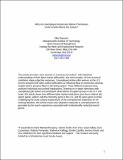Why Do Unemployed Americans Blame Themselves While Israelis Blame the System?
Author(s)
Sharone, Ofer
DownloadSharone_Why do.pdf (273.5Kb)
OPEN_ACCESS_POLICY
Open Access Policy
Creative Commons Attribution-Noncommercial-Share Alike
Terms of use
Metadata
Show full item recordAbstract
This article provides a new account of American job seekers’ individualized understandings of their labor-market difficulties, and more broadly, of how structural conditions shape subjective responses. Unemployed white-collar workers in the U.S. tend to interpret their labor market difficulties as reflecting flaws in themselves, while Israelis tend to perceive flaws in the hiring system. These different responses have profound individual and societal implications. Drawing on in-depth interviews with unemployed job seekers and participant observations at support groups in the U.S. and Israel, this article shows how different labor market institutions give rise to distinct job search games, which I call the chemistry game in the U.S. and the specs game in Israel. Challenging the broad cultural explanations of the unemployment experience in the existing literature, this article shows how subjective responses to unemployment are generated by the search experiences associated with institutionally rooted job search games.
Date issued
2013-05Department
Sloan School of ManagementJournal
Social Forces
Publisher
Oxford University Press
Citation
Sharone, Ofer. “Why Do Unemployed Americans Blame Themselves While Israelis Blame the System?” Social Forces 91, no. 4 (May 2, 2013): 1429–1450.
Version: Author's final manuscript
ISSN
0037-7732
1534-7605